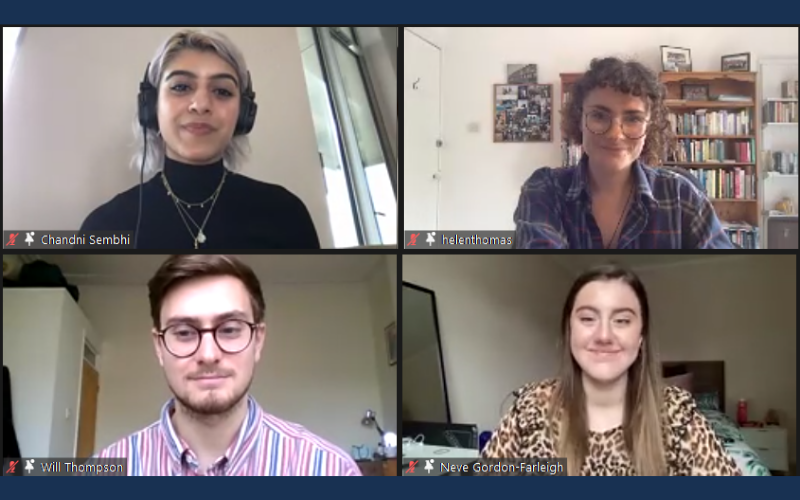We invited editors and producers from across the industry to share their advice and experiences of being a social media journalist.
The panellists included Chandni Sembhi, senior producer for PinkNews, Helen Thomas, senior social editor for VICE, Neve Gordon-Farleigh, TikTok producer for Journo Resources, and Will Thompson, social media manager and digital sports journalist for Sportsbeat.
What is a social media journalist?
In the age of social media, journalists have adapted to find stories, write pieces, film videos, and publish them in the spaces the public are most likely to consume them.
There is increasing demand for multimedia journalists who can navigate social media, consider audience analytics, and get creative with journalism that suits every type of social media platform.

Our social media journalism panellists gave advice to aspiring journalists via Zoom.
What skills do you need?
To be a good social media journalist, first and foremost you need to be a good journalist, reporting on the news quickly, accurately, and fairly.
You also need to develop some specific skills to make the most of the platforms available to you.
Will said: “One of the most important skills is your research because social media is a constantly changing landscape.”
Chandni and Helen agreed, saying you should learn the changing rules and trends of each platform, what the algorithms are, and learn to read and interpret social media analytics.
Helen said: “Numbers are the best proof of what people want. Not that we should let the algorithm decide our content, but you can use stats to guide you.”
There are plenty of tools out there to help journalists tell stories on social media.
Chandni said: “I use Canva all the time, it’s great. It helps to create a consistent theme across your platforms.”
✨NEW BLOG ✨
Being a journalist in 2021 means also being a visual storyteller… Check out our guide on how to use Canva as a journalist 👇https://t.co/EDTJEiHV8s— School of Journalism (@TheJournoSchool) July 16, 2021
How can you start getting experience?
The first step to launching any career is to get some real-world experience.
Although finding work experience can be difficult, there are loads of ways you can get started.
Neve said: “It’s about being able to put yourself out there. If there isn’t experience coming to you, make it yourself – create a blog or a YouTube channel for example.
“Showing your transferable skills might pay off more than a week of work experience where you make a few phone calls.”
Helen added that having a successful personal social media profile can boost your chances of landing a job in social media journalism.
She said: “TikTok is a really good resource. If you have the confidence to do it, it’s definitely something I would recommend.”
View this post on Instagram
What are some tips for applying to jobs?
All the panellists discussed the need to understand the brand of the company you are applying too.
Will said: “You have to understand the audience you are talking to. You have to know the tone of voice of who you are working for.
“Social channels are the shop windows for the brand, it’s what everyone sees, it’s public. You have to be mindful of the power of social media.”
Helen said it’s important to read and care about the publication you want to work for so you come across as genuine and enthusiastic.
View this post on Instagram
What are the biggest challenges?
Chandni spoke about the difficulty of navigating what you should be paid.
She said: “Pay can vary so wildly in this industry, it can depend on so many different things. When you’re starting out it’s really hard to know your worth.”
Will shared the challenge of coming up with fresh ideas when scheduling so much regular content.
He said: “Everyone gets creative block. Like with every job, take a break so you can come in fresh. You need to look outside the box.”
The panellists agreed about the need to be as impartial as possible.
Neve said: “Sometimes you do need to leave your opinions at the door. Find your niche and be consistent.”
What training do you need?
The panellists discussed the different routes you can take into social media journalism.
Helen said: “I would recommend doing an NCTJ journalism course because there are certain things you really need to learn, like media law and impartial reporting.
“I did a part-time course which meant I could work freelance alongside it. The NCTJ is very hands-on which I really liked.”
Chandni said: “Journalism courses are so good for meeting people and having those ready-made industry contacts.”
You don’t have to go straight into a journalism course to become a social media journalist – plenty of people go into the industry having had different jobs beforehand.
Alumna @LucilleEva shares how the journalism for a digital audience @NCTJ_news module has helped her career 💻 #TeamNA #StartedHere
Apply for our 2022 courses now 👇https://t.co/PUAff0g2Ag pic.twitter.com/ypng61olrm
— News Associates (@NewsAssociates) October 29, 2021
Will said: “It’s never too late. Go out and get the experience.
“There’s a lot of brands who want to use an authentic voice so if you become a micro-influencer who has an in-depth knowledge of something you can start working with brands and become a go-to person.”
Neve believes if you work hard enough you can always find a way into journalism.
She said: “If you’re willing to fill the gaps in your knowledge – with an NCTJ course, or another way – I certainly don’t think it’s ever too late to change your career path.”
Check out our blog on everything you need to know about studying journalism at university!

